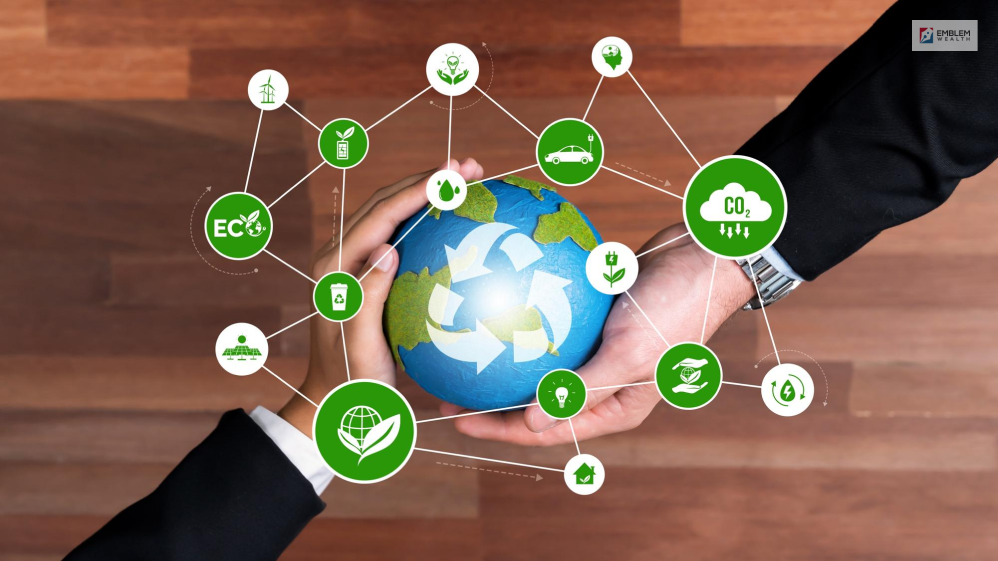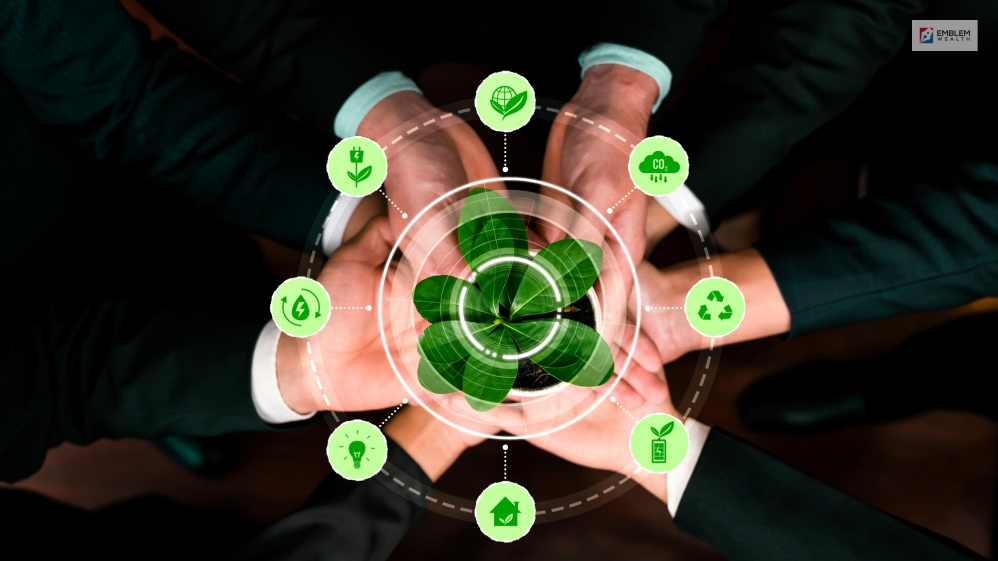Sustainable Supply Chains: The Green Backbone Of Capitalism

The challenges related to sustainability disrupt the overall functions of a particular business.
However, it also creates ample opportunities to make justified changes in your business that can help your business grow.
The supply chain is one area where sustainability can be a major opportunity to unlock the potential for a clean economy and establish a socially just system.
The perfect blend of sustainability and supply chain is a backbone for further revenue and other achievements.
If you are running a business already, you might be required to maintain transparency in your supply chain, like any other business operation. But what is your going from it? The answer is simple. You earn both efficiency and decrease your business’s harmful effect on the environment.
The real question is how we manage the complexity in supply chains and establish transparency for better outcomes. Let’s dive into this article, where I will help you learn about the importance of sustainable supply chains and how to harness technology to manage it more efficiently.
I will also guide you in understanding the challenges of sustainable supply chains and the solutions you need to apply for a well-planned, sustainable business.
What Is A Sustainable Supply Chain?

The concept of a sustainable supply chain comes from combining environmental, financial, and social factors into practices. You can integrate these factors in sourcing, producing, and distributing goods.
The entire process includes the lifecycle of the supply chain, from the raw materials to the disposal at the final stage.
But does it only limit itself to it? No. You can only call it sustainable once you ensure that humans decarbonize or reduce their carbon footprint, which will help you achieve a green economy.
However, you must consider environmental, social, and financial considerations.
Let’s learn how:
1. Environmental Considerations
The sustainable supply chain can only be successful if you have reduced greenhouse gas emissions, minimized wastage, and preserved natural resources. Together, these support you to combat climate change.
The companies can also adopt sustainable approaches, such as using renewable energies for supply chain operations.
2. Social Responsibilities
Ethical labor practices and proper working conditions are important for an effective supply chain. Moreover, businesses can foster positive relationships with suppliers, local communities, customers, and workers.
3. Financial Responsibilities
As a business owner, you must balance all sustainability goals to increase cost efficiency. Meaningful practices managing waste and energy can help ensure significant savings on overall costs.
Apart from the considerations, end-to-end supply chain transparency is also critical. The initiative to make the supply chain more sustainable must extend from the sourcing stage of the disposal stages to last-mile logistics. The product return stage and recycling processes are also important for the holistic approach.
In addition, the sustainable supply chain ensures that business organizations are reducing their carbon emissions and footprint and improving working conditions.
Importance Of Sustainable Supply Chains

Each business needs to adopt sustainable supply chains to focus on corporate efficiency and social responsibility, which is a driver that accelerates corporate social responsibilities toward success.
Nowadays, companies understand the importance of sustainable supply chains and align them with their daily operations to meet ethical standards. This includes treating employees fairly, transparent labor sourcing, shifting to renewable energy resources, and minimizing the environmental impact.
Business owners and customers prefer companies that commit to ethical values. If your company practices its operations ethically, you might win customers’ hearts and loyalty before your peer does.
On the other hand, businesses aim for compliance and sustainability goals like reducing waste, minimizing environmental impact, and more. Many companies also certify themselves, such as ISO14001.
Furthermore, organizations also focus on their environmental, social, and governance (ESG) goals. This helps them boost their brand image and create positive consumer and stakeholder relationships.
Technology’s Role In Sustainable Supply Chains

In Industry 4.0, advanced technologies bring advantages to almost every business layer. The supply chain is no different. The digital transformation of supply chain management increases the potential to pursue new sustainable opportunities.
Digital transformation and the growth of sophisticated technologies play a major role in the evolution of sustainable supply chain management. This allows practitioners to share their practices and demonstrate how they are working on their corporate social responsibilities.
Big Data management. RFID sensors, AI, and other security tools like blockchain ensure visibility and practice green supply. Furthermore, these technological advancements enhance the supply chain’s visibility and track and analyze data.
Moreover, it plays a huge role in managing risks, ultimately limiting the disruption in the supply chain.
Blockchain technology and AI also help businesses expand their boundaries based on performance. Moreover, they provide enough opportunities to maintain efficiency and foster resilience in the supply chain.
Although BCT’s practical application is limited, it enables a visible supply chain that has the potential to address visibility and traceability issues.
Besides these, smart sensors, telematics, and drones are also significant in green supply chain operations, reducing the carbon footprint and increasing customer satisfaction. Imagine you are trying to promote low fuel consumption. Driving the vehicles slowly can help you lower consumption. You can use telematics to track any such condition of your supply vehicles.
Challenges In Sustainable Supply Chains

The practice of a sustainable supply chain comes with both pros and cons. The pros are that you can save the planet while continuing your supply chain. The disadvantages are mostly related to the cost and complexity of the operations.
Other than that, there is an increased number of online shopping and geographical shifts due to the pandemic and lockdown that have impacted the overall act of maintaining sustainability in the supply chain.
Moreover, meeting the high demand for fast shipping while practicing sustainability can be a huge balance game for firms.
Another major challenge that you may find in a Sustainable Supply Chain is data integration and privacy concerns. You may need to synchronize various sources, such as suppliers and internal systems, to maintain visibility.
Privacy concerns related to real-time data can be a major issue. Balancing transparency while maintaining data protection requires careful treatment.
The balance between business objectives and environmental priorities is an unavoidable challenge. Many companies seek opportunities to create a harmonious relationship between profitability and ethical practices.
According to the reports, 62% of Indians believe in the coexistence between sustainable practices and profit. Meanwhile, other companies still need help aligning SDG goals with business organizations.
Thus, as a business owner, you need equilibrium if you want long-term success and adaptability.
Solutions: How To Make The Supply Chain More Sustainable

Capturing a fully benefited corporate social responsibility through environmental, financial, and social considerations requires a lot of focus beyond the premises of business. In that case, from components to logistics, every element takes part in this sustainable journey.
What if one supplier fails to maintain its SDG goals? Well, it can tarnish your business identity. Remember, even a supplier committed to making sustainable changes can contribute to improving your CSR bottom line.
To integrate sustainability in the supply chain, one should focus on the long-term goals for better improvements. Long-term goals can seek new opportunities for collaboration and innovation.
The lower tiers of the Sustainable Supply Chains and their practices can increase visibility and engage more with maintaining the code of conduct. On the other hand, empowering tier 1 and tier 2 fosters long-term relationships and improves communication channels.
Lastly, leveraging blockchain, AI, or machine learning technologies can increase visibility and help track real-time data.
Additionally, a commitment to net-zero emissions, supported by integrating technologies, can add more value to the sustainable supply chain.
What Happens When You Choose Sustainable Supply Chains

Whether you reduce waste or use electric vehicles for transportation efficiency, the sustainable supply chain can help your business improve and boost your overall revenues.
Here are the areas where you can see the improvement through sustainable supply chains:
A. Customer Retention
Customers now look for companies that do business while sharing their values and committed to environmental responsibilities. Almost 76% of consumers in the UK, USA, Germany, China, and Brazil prefer recycling more. So recycling as a part of sustainability can retain loyal customers for your business.
B. Employee Morale
According to a UK study, 54% of employees say sustainability is the key factor when choosing employers.
C. Partnerships
Successful sustainable supply chain practices and strategies can attract more business partners who share a vision of ethical business.
D. Corporate Image
As more organizations focus on corporate social responsibilities, the sustainable supply chain can help businesses reach the environmental, social, and governance or ESG goals. This practice can help to boost the corporate image, making it reliable for the business partners to collaborate.
Conclusion
In conclusion, sustainable supply chains can play a major role in achieving business success. These initiatives can help contribute to better environmental progress by minimizing carbon emissions to protect human rights.
Before developing strategies, it is important to understand the four dimensions- environmental, social, network, and financial considerations, while enhancing resilience and impact.
Read Also:


























Leave A Reply